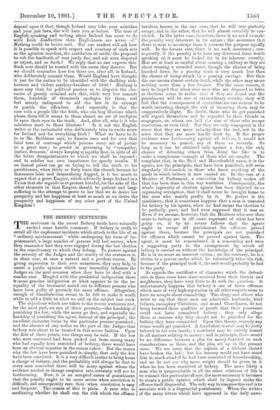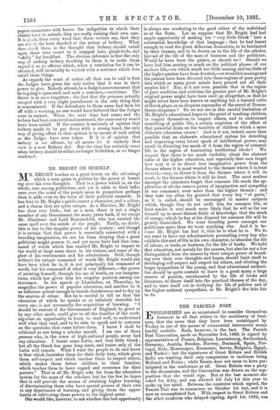THE BRIBERY SENTENCES.
THE sentences in the recent Bribery trials have naturally excited some hostile comment. If bribery is really to
entail all the unpleasant incidents which attach to the life of an " ordinary misdemeanant " while undergoing his term of im- prisonment, a large number of persons will feel uneasy, when they remember how they were engaged during the last election in the constituency to which they belong. To protest against the severity of the Judges and the cruelty of the sentences is, in their case, at once a natural and a prudent course. By giving expression to their own uneasiness, they may help to create a public opinion which may insensibly influence the Judges on the next occasion when they have to deal with a similar case. Mingled with this prudential indignation there as some genuine indignation at what appears to be the in- equality of the treatment meted out to different persons who have been guilty of precisely the same offence. Altogether, enough of dissatisfaction seems to be felt to make it worth while to add a little to what we said on the subject last week. The objections which are taken to the recent sentences rest, for the most part, on one of three grounds,—the hardship of punishing the few, while the many go free, and especially the hardship of punishing the agent, instead of the principal ; the excellent character borne by the particular persons punished ; and the absence of any notice on the part of the Judges that bribery was about to be treated in this severe fashion. Upon the first of these points, two things may be said. If the few who were sentenced had been picked out from among many who had equally been convicted of bribery, there would have been an obvious injustice in the course taken. But the reason why the few have been punished is, simply, that only the few have been convicted. It is a very difficult matter to bring home a charge of bribery, and the probability will always be that to every man convicted there will be many against whom the evidence needed to change suspicion into certainty will not be forthcoming. Noav, it is an accepted canon of punishment that the penalty onght to be more severe when conviction is difficult, and censevently rare, than when conviction is easy and frequent. .Tba reason of this is plain. A man who is meditating whether he shall run the risk which the offence involves, knows, in the one case, that he will very probably escape, and in the other, that he will almost certainly be con- victed. In the latter case, therefore, there is no need to make the penalty very deterrent in its nature ; the assurance that there is next to no escape from it answers the purpose equally well. In the former case, there is no such assurance ; con- sequently, if the penalty is to have any deterrent force worth speaking of, it must be looked for in its inherent severity. Men are at least as careful about crossing a railway as they are about crossing a crowded street, though the chance of being knocked down by a passing train is very much less than the chance of being struck by a passing carriage. But then the one means almost certain death, while the other may mean nothing more than a few bruises. For the same reason, it may be hoped that when once men who are disposed to bribe at elections come to realise that if they are found out the punishment will be one of extraordinary severity, they will feel that the consequences of conviction are too serious to be worth incurring, though the risk of incurring them may be comparatively slight. No doubt, those who do get punished will regard themselves and be regarded by their friends as scapegoats, on whom are laid the sins of those who escape conviction, or even trial. But they are only scapegoats in the sense that they are more unlucky than the rest, not in the sense that they are more hardly dealt by. If the proper evidence were forthcoming against all bribers, it would not be necessary to punish any of them so severely. So long as it can be obtained only against a few, the only chance of deterring others from doing the like is to make a conspicuous example of those who are caught. The complaint that, in the Deal and Maccelesfield cases, it is the agents, not the principals, that have been punished, wilt seem singularly ill-founded, to those who know anything of the mode in which bribery is now carried on. In the case of a Member of Parliament, a conviction for bribery makes all that has been done in this way worthless. Consequently, the whole ingenuity of election agents has been directed to so organising corruption, that it shall never be brought home to the man who mainly profits by it. So perfect is the machinery, that it sometimes happens that a man is unseated for bribery by his agents, when he had meant the election to be perfectly pure, and had even supposed that it was so. Even if we assume, however, that the Members who owe their seats to bribery are in all cases cognisant of what has been going on, it by no means follows that the agents ought to escape all punishment for offences proved against them, because the principals are not punished for offences which cannot be proved against them. The agent, it must be remembered, is a consenting and even a suggesting party to the arrangement by which all bribery is carried on without the knowledge of the principal. He is in no sense an innocent victim ; on the contrary, he is a victim to a system under which he voluntarily takes the risk, because if the principal took it, the seat would probably be lost to the party.
As regards the certificates of character which the defend- ants in these cases have since received from their friends and neighbouis, they have very little to do with the question. It unfortunately happens that bribery is one of those offences which men of very high reputation in all other respects seem to have no scruple about committing. The clergy and others who write to say that these men are admirable husbands, kind fathers, exemplary Christians, and sound Churchmen, do not bring forward these qualities as proofs that their possessors could not have committed bribery ; they only allege them as reasons why they should not be punished for the bribery they have committed. Upon this theory, scarcely any crime would get punished. A fraudulent trustee may be justly beloved in his own family, a murderer may be strictly honest in all matters relating to money ; and in principle, there would be no difference between a plea for mercy founded on such considerations as these, and the plea set up in the present cases. We are sorry that the captain of a lifeboat should have broken the law ; but his bravery would not have stood him in much stead if he bad been convicted of housebreaking, and we do not see why more weight should be given to it when he has been convicted of bribery. The more likely a man who is irreproachable in all the other relations of life is to commit this particular offence, the more necessary it becomes to create a public opinion which shall by degrees make the offence itself disgraceful. The only way to compass this end is to associate with it a disgraceful punishment. When the writers of the many letters which have appeared in the daily news- papers enumerate with horror the indignities to which their clients have to submit, they are really ruining their own case. It is plain, from every word that these writers say, that they are not in the least shocked at the notion of bribery. What does shock them is the thought that bribery should entail upon those who resort to it cropped hair, plank-beds, and " skilly " for breakfast. The obvious inference is that the only way of making bribery shocking to them is to make them regard it as an offence which, when a conviction for it can be obtained, will invariably be visited with a sentence which does entail these things.
As regards the want of notice, all that can be said is that the Judges have given the only notice that it was in their power to give. Nobody attends to a Judge's announcement that he is going to pass such and such a sentence,—next time. The threat is at once forgotten ; the fact that the prisoner actually escaped with a very slight punishment is the only thing that is remembered. If the defendants in these cases had been let off with a warning, no one would have believed that the Judges were in earnest. When the next time had come, and the bribers had been convicted and sentenced, the same outcry would have been raised. If the country is seriously of opinion that bribery needs to be put down with a strong hand, the only way of giving effect to that opinion is by means of such action as the Judges have now taken. If it is of opinion that bribery is no offence, by all means let it embody that view in a new Bribery Act. But the time has certainly come when bribery should be either no longer forbidden, or no longer condoned.







































 Previous page
Previous page